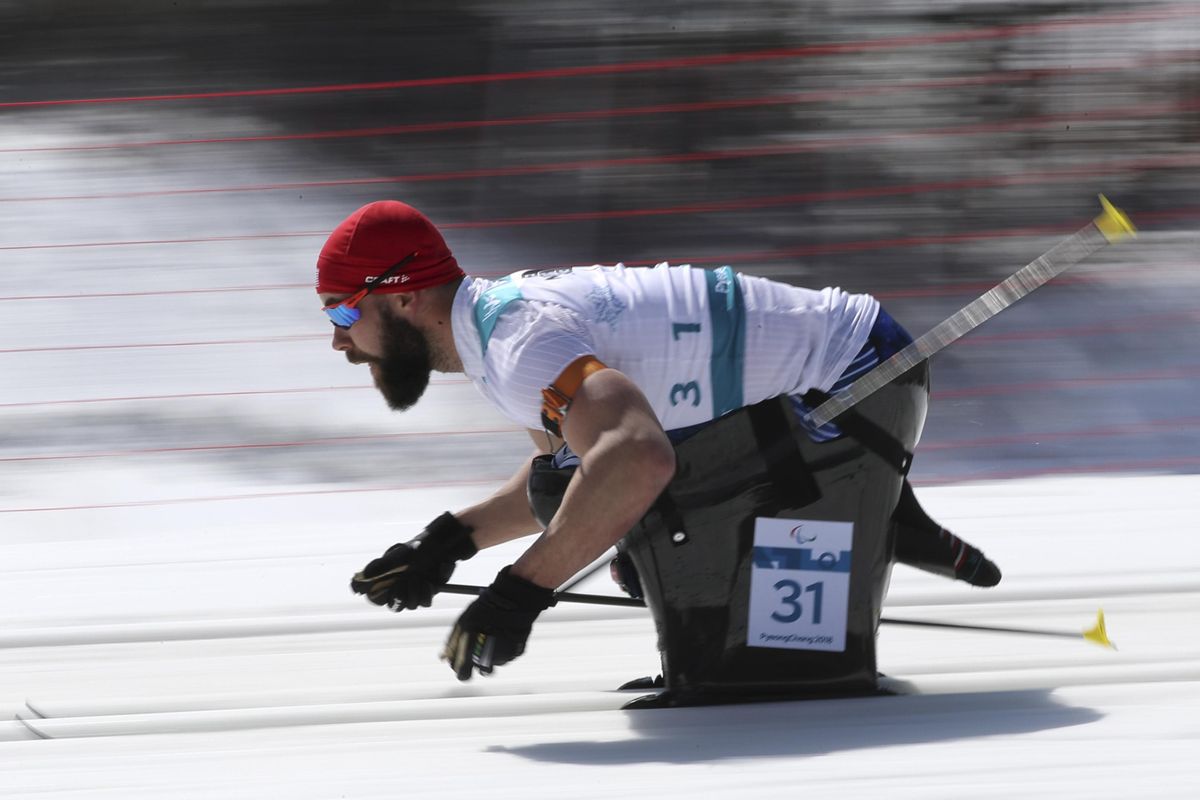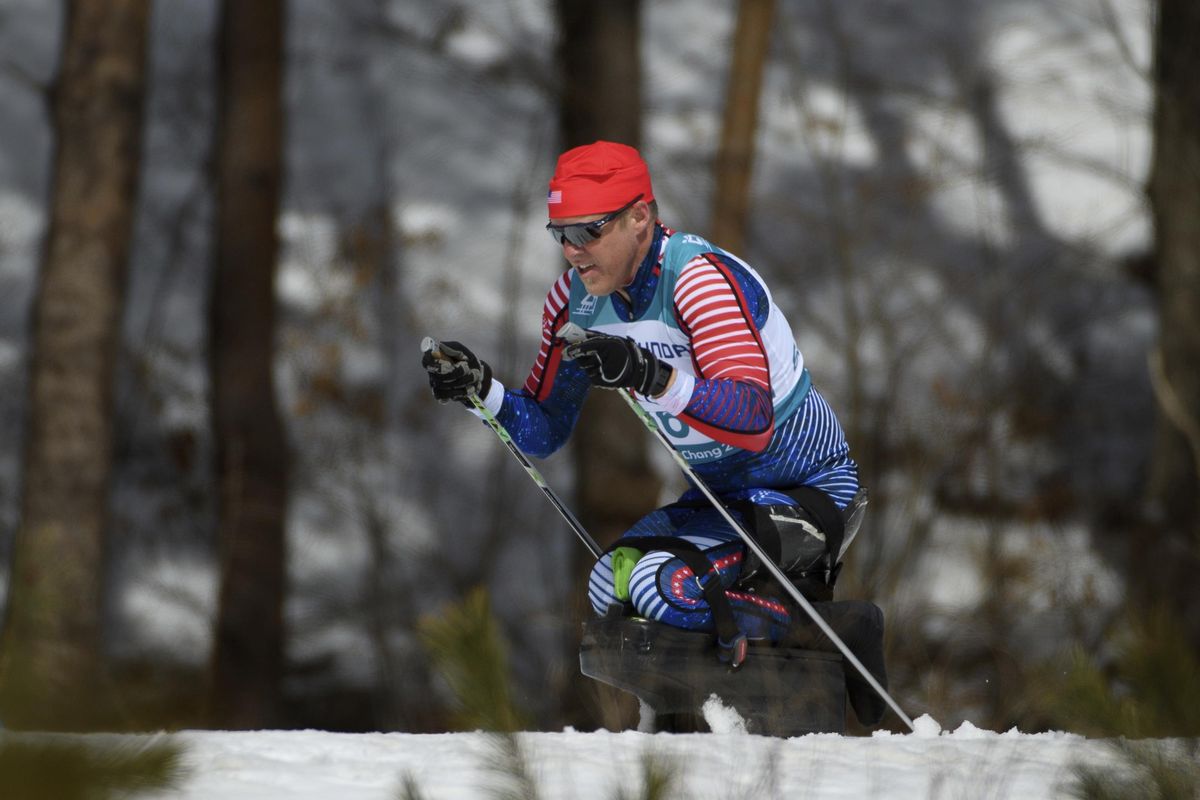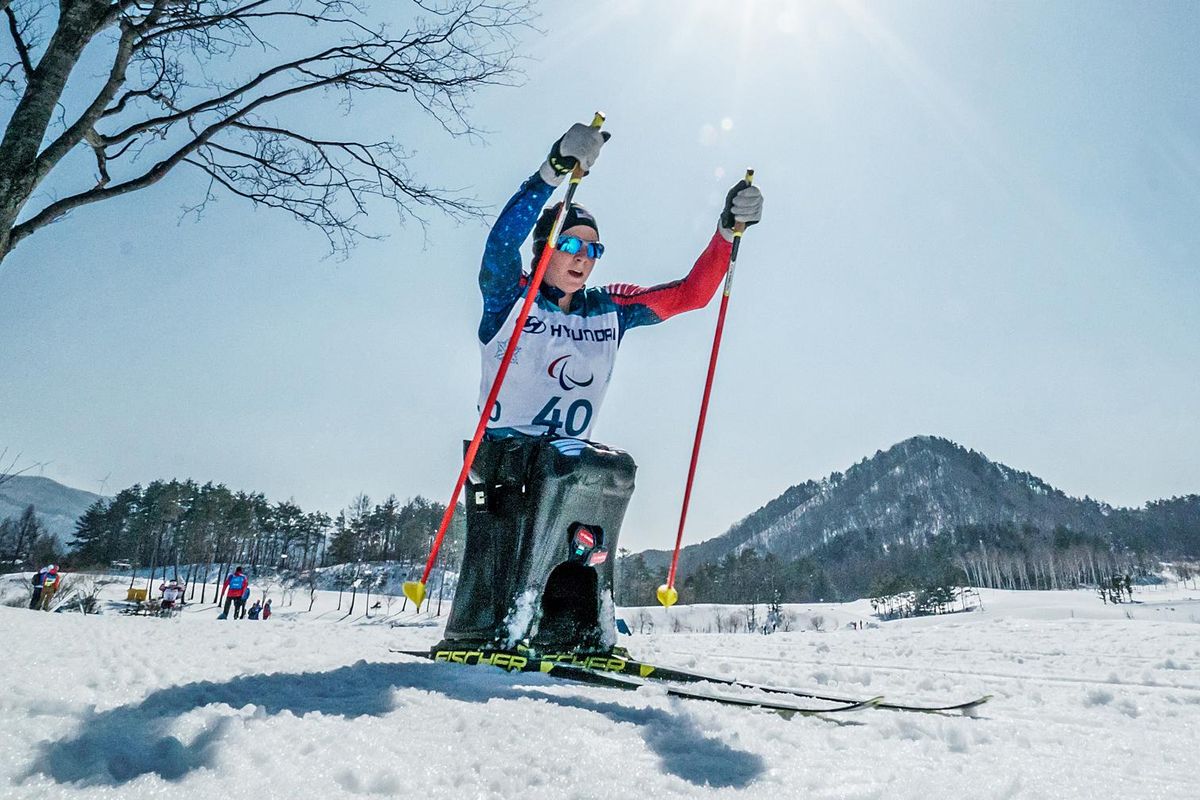Nordic Paralympians train in Bozeman to great success
Kendall Gretsch took four months off from her job to train with fellow Paralympians in Bozeman prior to March’s 2018 Pyeongchang Winter Paralympic Games in South Korea. The work paid off with two gold medals. (Joe Kusumoto / Courtesy)
BOZEMAN – In early March, some Bozeman residents took additional pride in the performance of athletes competing in the 2018 Paralympics in Pyeongchang, South Korea.
“You appreciate it more when you have a sense of how hard it is,” said Mike Wolfe, of Bozeman’s Mountain Project gym. “I wish I could have been there in person.”
Instead, he was yelling at the television with “chills going up and down” his spine.
That’s because prior to the competition, the Montana mountain town served as a second home and training center to four members of the U.S. Paralympic Nordic Ski Team. The group roomed, trained and worked out together at Mountain Project while also using the newly opened Crosscut Mountain Sports Center in the Bridger Mountains as a Nordic skiing and biathlon shooting facility.
“I got to go to some of their races locally,” Wolfe said. “It’s a little bit different. Even though I used to race, you don’t have a sense of how challenging it is. It’s mind-boggling how agile and strong those guys are.”
The Paralympians who trained in Bozeman included Andy Soule, Kendall Gretsch, Oksana Masters and Aaron Pike, who all competed in biathlon and cross country skiing. Only Gretsch had not competed in the Paralympics before.
“Initially, we were looking for a place that had good trails and skiing for sit skiers and a nearby airport for all our travels,” said Eileen Carey, head coach of the team, in an email. “We decided to have a training camp in Bozeman as a test for those things. But once we had a chance to spend time here, our decision to stay for good was simple. The incredible community support for Nordic paired with so many people and organizations willing to go the extra mile to make sure we had what we needed to create world-class athletes has made Bozeman a key component to our success.”
If Olympic hardware is any measure, the training seems to have paid off. The Nordic team of 13 athletes and two guides – Bozeman residents Sawyer Kesselheim and Kristina Trygstad-Saari, who assist visually impaired athletes – returned to the United States with “16 medals, including six gold, seven silver and three bronze,” according to the Team USA website. “Of those 16 medals, nine were secured in cross-country races, and seven were from biathlon events. Prior to (the 2018) Games, the U.S. only owned one biathlon medal in all Olympic or Paralympic competition.”
In 2018, the U.S. Paralympians brought home seven biathlon medals.
Gretsch won the first gold of 2018 for Team USA and also will have her name in the record books for taking the first gold medal won in biathlon by a U.S. Olympic or Paralympic athlete, male or female. Waiting for the results in that race was “definitely a bit nerve-wracking,” she said.
That feat seems more incredible considering that Gretsch, a 25-year-old from Downers Grove, Illinois, was a first-time competitor. Out of the seven events in which she competed, Gretsch won the 6-kilometer biathlon sitting sprint, edging out her training partner Masters, and the 12K cross country sitting race.
“It was good to be training together with each other every day,” Gretsch said in a phone interview after returning to her home in Madison, Wisconsin. “I was relatively new compared to everyone else on the team.”
Gretsch has spina bifida, a birth defect that keeps the spine and spinal cord from forming correctly. So when Nordic skiing and even shooting in the biathlon, she uses a sit ski – a lightweight chair-like device mounted on skis.
She attributes her success in the Paralympics to the four months she took off from her job to train with teammates in Bozeman. Gretsch doesn’t foresee getting that much time off again for a while, but she still hopes to return to Bozeman to train and attempt to make the U.S. team in four years for the 2022 Paralympics in Beijing.
Her fellow competitor and teammate Masters was key to pushing Gretsch to perform better.
“She’s the best in the world,” Gretsch said.
At 28 years old, Masters is a four-time Olympian who in South Korea won two golds, two silvers and a bronze medal. In her Olympics career, she’s won eight medals since first competing in 2012.
Masters did well despite injuring her elbow shortly before the Olympics. In the 10K biathlon on March 13, the pain was so severe it forced Masters to stop during the race. In a sign of just how close the team is, coach Carey ran onto the course and carried Masters off. The next day, Masters rallied to win her first gold medal in three games in the 1.1K sitting sprint.
Masters, who was born with birth defects resulting from exposure to radiation in the Chernobyl nuclear reactor meltdown, was honored by being named flag bearer for Team USA in the closing ceremonies. Although born in Ukraine, Masters grew up with adoptive parents in Louisville, Kentucky.
Soule, who lost his legs to amputation after an IED exploded next to his vehicle while fighting for the U.S. Army in Afghanistan, took gold in the cross country sprint and a bronze in biathlon, his second and third Paralympic medals. The 37-year-old Kerrville, Texas, resident was a three-time Paralympian.
“This is my last Paralympic race, but we have a couple of young athletes here,” Soule is quoted on the Team USA website saying. “We’ll have a great team for a long time.”
“Nothing my athletes or our staff did in Pyeongchang surprised me,” coach Carey said. “I have seen enough from all our team to know that when we are on and work together effectively, that we create something special. It motivates and amazes me, but I also see it every day in one way or another. It was cool for it to come together on the world stage so the rest of the world could see what I see on a daily basis.”
The road to that success – at least folks in Montana can now claim – winds through Bozeman and the Bridger Mountains.
“Having a home base has been key to our team’s rise,” Carey said. “Before 2016, we didn’t have a base for our team, and would come together only for competitions and training camps. To return from a long World Cup trip and have a perfect set-up to continue training has made a big difference in our program’s ability to perform.
“The single-biggest component to that has been our relationship to Crosscut Mountain Sports Center. All of our competitions consists of half cross-country races and half biathlon. Before we moved to Bozeman, we didn’t have a place to shoot consistently. When we arrived in Bozeman and identified that as a need, Crosscut Mountain Sports Center and Bridger Biathlon Club provided the piece we were missing. They built us a range and have supported us in so many ways to make sure our athletes have what they need for success. It has been an incredible experience for our athletes and team and one that will continue to be huge component to our future success.”
Carey also singled out Stuart Jennings, Lowell Bailey and Eric Love at Crosscut Mountain Sports Center; Kelly Kjorlien at the Bridger Biathlon Club; Wolfe at Mountain Project gym; and groomer Kyle Marvinney for praise.
Carey, who lives in Bozeman, is a product of Maine, where she dominated Nordic events in high school and went on to compete in college. Her coaching success was honored last year when she was named Paralympic Coach of the Year by the U.S. Olympic Committee.
Despite the Nordic team’s amazing success at the Paralympics, Carey said her athletes are not fixated on the finish line and taking home medals.
“We don’t focus much on results,” she said. “We focus on putting the pieces together for a great performance every time we are on snow. That goes for the athletes but also for the coaches, wax technicians and the entire support team. I knew that when we do all those things to the level we are capable of, that great things happen. I knew our team was capable of the results we achieved in Pyeongchang. Of course, when it all comes together at the right time, it is an incredible feeling and one we certainly don’t take for granted.”


